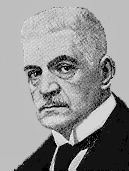
Russian Baltic Navy killed by the rebellious sailors in
the Sveaborg Naval Base and in the streets of Helsinki
during the Russian February revolution of 1917.
(The Church of the Helsinki Orthodox Cemetary).
 |
|
Russian Baltic Navy killed by the rebellious sailors in the Sveaborg Naval Base and in the streets of Helsinki during the Russian February revolution of 1917. (The Church of the Helsinki Orthodox Cemetary). |
Helsinki, at the end of March 1917.
 A chapter from "Från händelserika år I-II" (Eventful years), Helsinki1920, the memoirs of Edvard Immanuel Hjelt (1855-1921), professor in chemistry, honorary state councellor, senator, rector och high chancellor of Helsinki University.
A chapter from "Från händelserika år I-II" (Eventful years), Helsinki1920, the memoirs of Edvard Immanuel Hjelt (1855-1921), professor in chemistry, honorary state councellor, senator, rector och high chancellor of Helsinki University.
Translated by Pauli Kruhse .
Back to the history page.